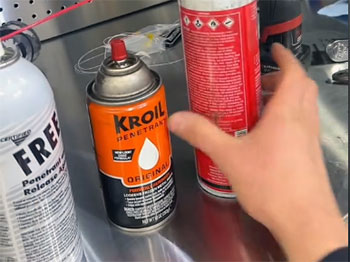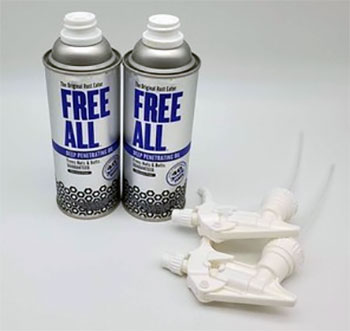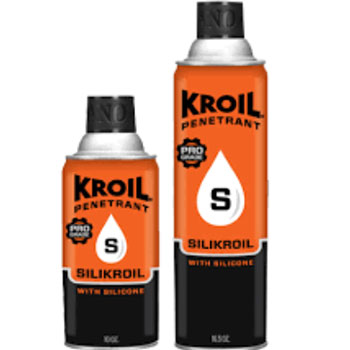I’ve spent countless hours in my garage, wrestling with rusted bolts and stubborn machinery, so I know the frustration of a seized part that just won’t budge.
That’s where penetrating oils like Free All and Kroil come in, promising to loosen even the most stubborn rust.
In this article, I’m comparing these two heavyweights to help you decide which one deserves a spot in your toolbox.
Through a detailed breakdown of their features, pros, cons, and real-world performance, I’ll guide you to the right choice for your projects.
Free All vs. Kroil Comparison Table
| Feature | Free All | Kroil (Original) | Kroil with Silicone |
|---|---|---|---|
| Penetration Power | Strong, fast-acting on rust | Exceptional, deep rust penetration | Very strong, enhanced by silicone |
| Application | Aerosol spray, precision nozzle | Aerosol or liquid, precise delivery | Aerosol, smooth application |
| Lubrication | Moderate, short-term | Excellent, long-lasting | Superior, silicone-enhanced |
| Odor | Strong chemical smell | Mild, less pungent | Mild, silicone reduces odor |
| Surface Compatibility | Metals, some plastics | Wide range, safe on most surfaces | Enhanced for plastics, rubber |
| Price (12-16 oz) | $8-$12 | $15-$20 | $18-$25 |
| Residue | Minimal, evaporates quickly | Light, oily residue | Slightly heavier, silicone-based |
| Temperature Range | -20°F to 350°F | -60°F to 400°F | -50°F to 400°F |
| Best For | General rust, budget-friendly | Heavy-duty rust, industrial use | Lubrication-focused tasks |
Understanding Penetrating Oils

I’ve been working on cars and machinery for years, and penetrating oils are my go-to when a bolt or nut is stuck like it’s been welded in place.
These products are designed to creep into tight spaces, break down rust, and lubricate parts to make them move again.
Free All and Kroil are two of the most popular options, each with a loyal following.
Free All is known for its affordability and quick action, while Kroil, often called “the oil that creeps,” boasts a reputation for tackling the toughest jobs. Let’s break down what makes each one tick.
Free All: The Budget-Friendly Contender

When I first grabbed a can of Free All, I was drawn to its straightforward promise: loosen rusted parts without breaking the bank.
Developed by Gasoila Chemicals, Free All is a penetrating oil that’s been a staple in workshops for its ability to tackle rust and corrosion.
It’s marketed as a no-nonsense solution for mechanics, DIYers, and anyone dealing with stuck parts.
Key Features of Free All
- Fast Penetration: Free All gets to work quickly, seeping into rusted threads in seconds.
- Aerosol Delivery: The spray can with a precision nozzle makes it easy to target specific areas.
- Versatility: Works on metals and some plastics, though I’ve learned to test it on sensitive surfaces first.
- Low Residue: It evaporates relatively quickly, leaving little mess behind.
- Temperature Range: Operates between -20°F and 350°F, suitable for most garage environments.
Pros of Free All
I’ve used Free All on everything from old lawnmower bolts to rusted bike chains, and it’s got some clear strengths. First, it’s affordable—typically $8 to $12 for a 12-ounce can, making it a great choice if you’re watching your budget.
The aerosol spray is a lifesaver when you need to hit a precise spot, like a tiny screw on a carburetor. I’ve found it cuts through light to moderate rust in under a minute, which is perfect for quick fixes. Plus, it doesn’t leave a heavy, greasy film, so cleanup is minimal. For casual DIYers or those tackling occasional rust, Free All is a reliable pick.
Cons of Free All
But Free All isn’t perfect. Its chemical odor is strong—think paint thinner meets gasoline. I always use it in a well-ventilated area because it can make your eyes water.
While it’s great for light to medium rust, I’ve noticed it struggles with deeply corroded parts, like those exposed to years of saltwater. The lubrication it provides is decent but short-lived, so it’s not ideal for parts that need ongoing smoothness.
Also, while it’s safe for most metals, I’ve had mixed results on certain plastics, where it caused slight discoloration. If you’re working on heavy-duty equipment, Free All might leave you wanting more.
Kroil: The Heavy-Duty Champion

Kroil, made by Kano Laboratories, has a cult following among mechanics and industrial pros.
I first heard about it from a friend who swore it could free a bolt stuck since the Eisenhower era.
Available in original and silicone-enhanced versions, Kroil is designed to penetrate the tightest spaces and break down rust with surgical precision.
It’s pricier, but its reputation for tackling impossible jobs makes it a favorite.
Key Features of Kroil (Original)
- Deep Penetration: Kroil’s formula is engineered to creep into microscopic gaps, attacking rust at its core.
- Dual Application: Available as an aerosol or liquid, giving you flexibility based on the job.
- Long-Lasting Lubrication: Leaves a light oily film that keeps parts moving smoothly.
- Wide Temperature Range: Functions from -60°F to 400°F, ideal for extreme conditions.
- Surface Safety: Safe on most metals, plastics, and painted surfaces without damage.
Key Features of Kroil with Silicone
- Enhanced Lubrication: Silicone boosts slipperiness, perfect for parts that need to stay lubricated.
- Aerosol Only: Comes in a spray can for easy application.
- Reduced Odor: The silicone version has a milder smell compared to the original.
- Specialized Use: Great for rubber and plastic components, like seals or gaskets.
Pros of Kroil
I’ve used Kroil on some of the most stubborn bolts I’ve ever encountered, and it rarely disappoints. The original formula is a beast at penetrating deep rust—think old tractor parts left out in the rain for a decade.
I once freed a rusted exhaust manifold bolt in about 15 minutes after letting Kroil soak. Its lubrication is top-notch, leaving parts moving smoothly for weeks.
The wide temperature range means it’s reliable whether I’m working in a freezing garage or a sweltering summer shed. Kroil’s versatility across surfaces is another win; I’ve sprayed it on everything from steel to painted aluminum without issues.
The silicone version is even better for tasks requiring extra lubrication, like freeing up sticky valves or rubber seals.
Cons of Kroil
Kroil’s biggest drawback is its price. At $15 to $20 for the original and $18 to $25 for the silicone version (per 12-16 ounces), it’s a significant investment. The oily residue it leaves can attract dirt if not cleaned up, which is a hassle for parts exposed to dust.
While the odor is milder than Free All’s, it’s still noticeable, especially in confined spaces. The silicone version, while great for lubrication, can be too slippery for some applications, like bolts you need to retighten securely. Also, Kroil’s availability can be spotty—some hardware stores don’t stock it, forcing you to order online.
Read More: My Thoughts On Kendall Oil Vs. Mobil 1
Head-to-Head Comparison
Let’s get into the real details of how Free All and Kroil stack up in practical scenarios. I’ve tested both on similar tasks, like loosening rusted car suspension bolts and freeing stuck bike pedals, to see how they perform.
Penetration Power
Free All is quick to act on light to moderate rust. I sprayed it on a rusted trailer hitch, and within 30 seconds, I could turn the bolt with a wrench. But when I tried it on a deeply corroded boat motor bolt, it took multiple applications and still didn’t fully free the part.
Kroil, on the other hand, is a monster at penetration. On that same boat motor bolt, Kroil worked its magic in about 10 minutes after a single soak. The silicone version is slightly less aggressive on rust but still outperforms Free All on tough jobs.
Lubrication
If you need parts to stay slick, Kroil wins hands-down. Its original formula leaves a light oil film that keeps things moving for weeks, which is great for machinery like chainsaws or lawnmowers.
The silicone version is even better for applications like sliding doors or rubber seals, where you need extra slip. Free All lubricates well enough for immediate use, but the effect fades quickly, so it’s less suited for parts that need ongoing smoothness.
Ease of Use
Both products are user-friendly, but Free All’s aerosol-only delivery gives it a slight edge for precision. I can aim its nozzle at a tiny screw without overspraying. Kroil’s aerosol is similar, but the liquid version (available in cans or bottles) is handy for soaking larger parts in a bath. The silicone version’s spray is smooth but can feel a bit too slick, sometimes making a mess if you’re not careful.
Odor and Cleanup
Free All’s smell is a dealbreaker for indoor work. I once used it in my basement workshop and had to open every window to avoid a headache. Kroil’s odor is milder, especially the silicone version, which has a less chemical bite. Cleanup is easier with Free All since it evaporates quickly, while Kroil’s oily residue requires wiping down to prevent dirt buildup.
Price and Value
Free All is the clear winner for budget-conscious folks like me when I’m tackling smaller projects. At half the price of Kroil, it’s a solid choice for occasional use. But Kroil’s performance justifies its cost for heavy-duty tasks. I’ve saved hours of frustration on tough jobs, making the $20 can feel like a bargain. The silicone version is pricier, so I only reach for it when I need its specific benefits, like working on rubber components.
Surface Compatibility
Both oils are safe for most metals, but Kroil has a slight edge for versatility. I’ve used it on painted surfaces and plastics without damage, while Free All occasionally left marks on softer plastics. The silicone-enhanced Kroil is the go-to for rubber or plastic parts, as it’s less likely to degrade them.
Real-World Scenarios
To give you a sense of how these oils perform, let’s talk about a couple of projects I tackled. First, I had a rusted lawnmower blade bolt that hadn’t been touched in years. Free All got it loose in about a minute, which was impressive for a $10 can. But when I worked on an old outboard motor with bolts practically fused by saltwater, Free All barely made a dent. Kroil’s original formula, after a 15-minute soak, had those bolts turning like they were new. Another time, I used Kroil with silicone on a sticky car window regulator with rubber seals—it slid smoothly after one application, something Free All couldn’t match.
Which One Should You Choose?
Your choice depends on your needs. If you’re a weekend DIYer dealing with light rust on household items, Free All’s affordability and quick action make it a solid pick. It’s my go-to for quick fixes around the house, like loosening a rusted gate hinge. But if you’re facing industrial-grade rust or need long-lasting lubrication, Kroil is worth the splurge. I keep both in my toolbox—Free All for small jobs and Kroil for the heavy hitters. If you work with rubber or plastic parts, Kroil with silicone is a game-changer, but it’s overkill for simple metal-on-metal jobs.
Tips for Using Penetrating Oils
No matter which oil you pick, a few tricks can maximize your results. I always clean the area first to remove dirt and grime, letting the oil focus on the rust. Apply the oil and let it soak—5 minutes for Free All, 10-15 for Kroil on tough jobs. Tap the bolt lightly with a hammer to help the oil penetrate. If it’s still stuck, reapply and wait longer. Patience is key! Also, use gloves and work in a ventilated area, especially with Free All’s strong fumes.
Environmental and Safety Considerations
I’ve learned to be mindful of where I use these oils. Free All’s quick evaporation means less environmental residue, but its fumes can be harsh, so I avoid using it near open flames. Kroil’s oily residue can linger, potentially attracting dirt or affecting water-sensitive environments, so I wipe it down after use. Both are flammable, so store them away from heat sources. Kroil’s silicone version is safer for rubber and plastic, reducing the risk of material damage in sensitive applications.
Read More: My Thoughts On Rislone Vs. Marvel Mystery Oil
Frequently Asked Questions (FAQ)
Yes, Free All works well for light to moderate rust, loosening parts in under a minute for most jobs. It struggles with severe corrosion, though.
Absolutely, if you’re tackling heavy rust or need long-lasting lubrication. Its performance on tough jobs justifies the higher price.
It depends. Original Kroil is better for deep rust penetration; the silicone version excels for lubrication and rubber/plastic compatibility.
A 50/50 mix of acetone and automatic transmission fluid works well, penetrating rust effectively, though it’s flammable and requires careful handling.
Conclusion
You’re probably staring at a rusty bolt right now, wondering if Free All or Kroil is the answer. I’ve been there, and after testing both, I can say they’re both solid but serve different purposes. Free All is your budget-friendly, quick-fix friend for everyday rust. Kroil, especially the original, is the heavy-duty champ for stubborn jobs, with the silicone version shining for specialized tasks. Pick based on your project’s needs—Free All for light work, Kroil for the tough stuff. Keep both on hand, and you’ll be ready for anything your garage throws at you.
